The Suju Names Post!
Are you ready to see the depths of my linguistic geekdom and the extent of my procrastination? Prepare yourselves, because this is THE SUJU NAMES POST!
Or, you know, a Suju names post. What I've done is to prepare the following information about the thirteen member's names and present it in the following format:
Name
Hangul: The name as written in the Korean phonemic alphabet, hangul.
If there is interest, I can do the same for Henry and Zhou Mi. Done. :D
A request before proceeding: I have a background in linguistics, but I know next to nothing about Chinese and have only a linguist's knowledge of Korean, so if you see any mistakes please do point them out. That said, enjoy!
GIVEN NAMES
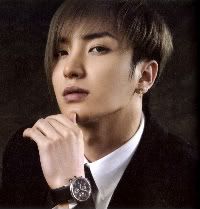
Eeteuk
Hangul: 이특
Jungsu
Hangul: 정수
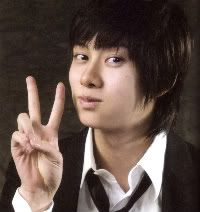
Heechul
Hangul: 희철
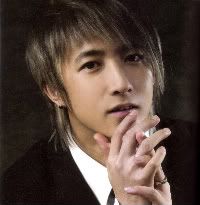
Geng
Hangul: 경

Yesung
Hangul: 예성
Jongwoon
Hangul: 종운
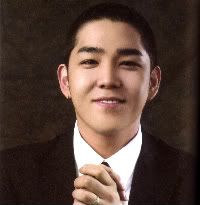
Kangin
Hangul: 강인
Youngwoon
Hangul: 영운
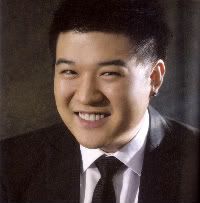
Shindong
Hangul: 신동
Donghee
Hangul: 동희
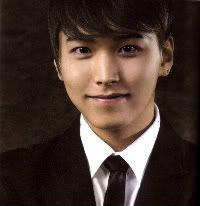
Sungmin
Hangul: 성민
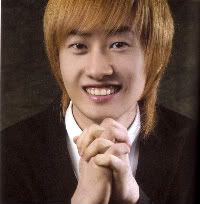
Eunhyuk
Hangul: 은혁
Hyukjae
Hangul: 혁재
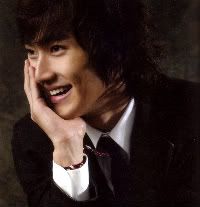
Siwon
Hangul: 시원

Mi
Hangul: 멱
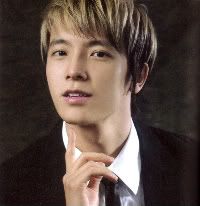
Donghae
Hangul: 동해
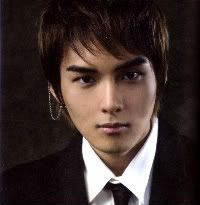
Ryeowook
Hangul: 려욱

Kibum
Hangul: 기범
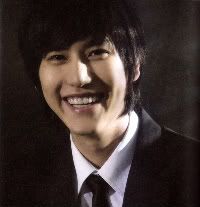
Kyuhyun
Hangul: 규현

Henry
Hangul: 헨리
Hinwa
Hangul: 헌화
SURNAMES
Kim
surname of Heechul, Yesung, Kangin, Kibum and Ryeowook
Hangul: 김
Notes: 1 in 5 Koreans is named Kim, making it the most common surname in the country.
Lee
surname of Sungmin, Eunhyuk and Donghae
Hangul: 이
Notes: 1 in 7 Koreans is named Lee, making it the second most common surname in the country. This name used to be universally pronounced /ɾi/ and it retains this pronunciation in North Korea; though the consonant has been lost in the dialect spoken in the Republic of Korea, the name is still often romanized as "Lee" for the sake of historical continuity, as well as for continuity with the other languages that use/have used Chinese characters. It is likely due to this that "Eeteuk" is sometimes rendered "Leeteuk."
Park
surname of Eeteuk
Hangul: 박
Notes: 1 in 12 Koreans is named Park, making it the third most common surname in the country.
Choi
surname of Siwon
Hangul: 최
Notes: 1 in 20 Koreans is named Choi, making it the fourth most common surname in the country.
Cho
surname of Kyuhyun
Hangul: 조
Notes: 1 in 50 Koreans is named Cho, making it the seventh most common surname in the country.
Shin
surname of Shindong
Hangul: 신
Notes: 1 in 67 Koreans is named Shin, making it the tenth most common surname in the country.
Lau
surname of Henry
Hangul: 류
Notes: Lau is the 4th most common surname in China.
Zhou
surname of Mi
Hangul: 주
Notes: Zhou is the 9th most common surname in China.
Han
surname of Geng
Hangul: 한
Notes: Han is the 26th most common surname in China.
A GUIDE TO IPA SYMBOLS
What follows are short explanations of the IPA symbols used in this entry. More detailed explanations can be found on Wikipedia, where most of this information comes from, and the sounds themselves can be heard here.
Or, you know, a Suju names post. What I've done is to prepare the following information about the thirteen member's names and present it in the following format:
Name
Hangul: The name as written in the Korean phonemic alphabet, hangul.
- Korean Romanization: The name romanized according to the rules of the Revised Romanization system favored by the South Korean government.
- Mandarin Romanization: The reading of these characters in Mandarin Chinese as romanized in pinyin.
- Cantonese Romanization: The reading of these characters in Cantonese as romanized in the Yale system.
- Japanese Romanization: The Sino-Japanese reading of the characters as romanized in the Hepburn system. As there are often multiple readings for Chinese characters in Japanese, I chose readings based on the meanings of the characters and similarity with Korean pronunciation.
- IPA: The pronunciation of the name as rendered in the International Phonetic Alphabet for those who want to make sure their pronunciation is as accurate as possible. Short explanations of all symbols used can be found at the bottom of this entry.
- English Approximation: A rough guide using English sounds to approximate the name's pronunciation for those who aren't interested in the linguistic nitty-gritty; as such, it will not result in completely accurate pronunciation. What's more, the pronunciation of vowels in English varies significantly across dialects. I speak Inland Northern American English and my examples are chosen based on my pronunciation. I have tried to note examples in which this will make a difference, but it is possible that I have missed some.
- First Character: The various meanings of the first character of the name according to the 네이버 한자사전 (Naver Hanja Dictionary). The principal meaning is italicized.
- Second Character: The same for the second character of the name.
- As A Whole: An attempt to put the meanings of the two characters together and come up with a meaning for the name as a whole. There are multiple interpretations possible-feel free to think up your own. And please don't be offended by the content under strikethrough; I mean it purely in jest.
If there is interest, I can do the same for Henry and Zhou Mi. Done. :D
A request before proceeding: I have a background in linguistics, but I know next to nothing about Chinese and have only a linguist's knowledge of Korean, so if you see any mistakes please do point them out. That said, enjoy!
GIVEN NAMES

Eeteuk
Hangul: 이특
- Korean Romanization: Iteuk
- Mandarin Romanization: Lìtè
- Cantonese Romanization: Leihdahk
- Japanese Romanization: Ritoku
- IPA: ithɯk̚
- English Approximation: The first syllable is pronounced as in the English letter "E." The second sounds very similar to the English word "took."
- First Character: profit; advantage; benefit
- Second Character: special; distinguished, outstanding
- As A Whole: "The advantage of being 'special'." "Special advantage or benefit."
Jungsu
Hangul: 정수
- Korean Romanization: Jeongsu
- Mandarin Romanization: Zhèngzhū
- Cantonese Romanization: Jingjyū
- Japanese Romanization: Jōshu
- IPA: tɕʌŋsu
- English Approximation: The first syllable is pronounced like the English word "jump," only with an "ng" instead of the "mp." The second is like the English word "sue."
- First Character: straight, upright; true, correct; just, righteous
- Second Character: the water's edge, the beach; name of a Chinese river
- As A Whole: It could be that the second character is simply used for its phonetic value (i.e., its sound), but if we want to put the two meanings together, I suppose we could say that this name means "straight along the water's edge" or "as straight as the river Zhū." The river would have to be slightly...bent, wouldn't it? ;D

Heechul
Hangul: 희철
- Korean Romanization: Huicheol
- Mandarin Romanization: Xīchè
- Cantonese Romanization: Hēichit
- Japanese Romanization: Kitetsu
- IPA: çitɕhʌl
- English Approximation: The first syllable is pronounced as in the English word "he." The second sounds like the English word "gull," only with a "ch" instead of a "g."
- First Character: wish, desire, request; to long for, yearn for; hope; adored, admired; rare, scarce
- Second Character: clean, clear, pure
- As A Whole: "Pure, unadulterated desire." Hubba hubba. "Rare clarity" or "a pure hope."

Geng
Hangul: 경
- Korean Romanization: Gyeong
- Mandarin Romanization: Gēng
- Cantonese Romanization: Gāng
- Japanese Romanization: Kō
- IPA: gəŋ˥˥
- English Approximation: Pronounced like the "gung" in the borrowed word "gung ho." It is pronounced with the first tone, which is a steady high tone.

Yesung
Hangul: 예성
- Korean Romanization: Yeseong
- Mandarin Romanization: Yìshēng
- Cantonese Romanization: Ngaihsēng
- Japanese Romanization: Geisei
- IPA: jesʌŋ
- English Approximation: The first syllable is pronounced like the word "yet" in Australian English but without the "t" sound at the end. The second syllable is pronounced as in the English word "sung."
- First Character: art; craft; performance; acting; trick, stunt
- Second Character: sound; voice; tone; music
- As A Whole: "Stunt voice," as in, "Yesung played the part of the stunt voice in SJ-M's 'U'." "An artful sound" or "a skilled voice."
Jongwoon
Hangul: 종운
- Korean Romanization: Jong-un
- Mandarin Romanization: Zhōngyún
- Cantonese Romanization: Jūngwàhn
- Japanese Romanization: Shōun
- IPA: tɕoŋun
- English Approximation: The first syllable is pronounced like the name "Joe" with an "ng" on the end. The second syllable is pronounced like the Spanish word "un," or like the English word "spoon" without the "sp."
- First Character: bell; constant, consistent; gather together
- Second Character: cloud; sky, Milky Way; tell
- As A Whole: "Constantly telling," and yet constantly edited out. XD "A bell cloud" or "the constant sky."

Kangin
Hangul: 강인
- Korean Romanization: Gang-in
- Mandarin Romanization: Qiángrén
- Cantonese Romanization: Kèuhngyàhn
- Japanese Romanization: Kyōjin
- IPA: kaŋin
- English Approximation: The first syllable is pronounced like the word "scar" in Inland Northern American English, but without the "s" and "r" sounds and with an "ng" sound at the end. The second syllable is pronounced like the English word "seen" without the "s."
- First Character: strong; firm; brave; hard-working
- Second Character: gentle, kindhearted, benevolent; sensitive; loving; to take pity
- As A Whole: "Firm yet sensisitve"-oh la la! XD "Strong but kind." Rather fitting, I think.
Youngwoon
Hangul: 영운
- Korean Romanization: Yeong-un
- Mandarin Romanization: Yǒngyún
- Cantonese Romanization: Wíhngwàhn
- Japanese Romanization: Eiun
- IPA: jʌŋun
- English Approximation: The first syllable is pronounced as in the English word "young." The second is pronounced like the Spanish word "un," or like the English word "spoon" with the "sp."
- First Character: long (time); deep, far; eternally
- Second Character: cloud; sky, Milky Way; to tell
- As A Whole: Eternally...to tell...well, he does talk a lot... ;D Perhaps "the eternal sky" or "the depths of the Milky Way."

Shindong
Hangul: 신동
- Korean Romanization: Sindong
- Mandarin Romanization: Shéngtóng
- Cantonese Romanization: Sàhntùhng
- Japanese Romanization: Shindō
- IPA: ɕindoŋ
- English Approximation: The first syllable is pronounced as in the English word "sheen." The second syllable is pronounced like the English word "doe" with an "ng" on the end.
- First Character: god(s), spirit, soul; mind, heart; virtuous; lofty
- Second Character: child; servant
- As A Whole: "Child" and "mind?" The joke's too easy. This name is actually a word in Korean, meaning "child prodigy" or "whiz kid." (thanks, thunderbloom)
Donghee
Hangul: 동희
- Korean Romanization: Donghui
- Mandarin Romanization: Dōngxī
- Cantonese Romanization: Dūnghēi
- Japanese Romanization: Tōki
- IPA: toŋi
- English Approximation: The first syllable is pronounced like the English word "stow" without the "s" sound at the beginning and with an "ng" sound at the end. The second syllable is pronounced as in the English letter "E."
- First Character: east; eastward
- Second Character: shining, bright; pleased, glad; fun, merry; happiness, fortune
- As A Whole: "For a good time, go east and ask for Donghee. ♥" "Merriment and good fortune in the east."

Sungmin
Hangul: 성민
- Korean Romanization: Seongmin
- Mandarin Romanization: Shèngmǐn
- Cantonese Romanization: Sìhngmáhn
- Japanese Romanization: Seibin
- IPA: sʌŋmin
- English Approximation: The first syllable is pronounced as in the English word "sung." The second syllable is pronounced as in the English word "mean."
- First Character: bright, light; prosperous, flourishing; exulted, admired, adored
- Second Character: quick, agile, shrewd; clever, intelligent; respectful; hard-working
- As A Whole: "The shit." Look at all them nice adjectives! "Bright and agile."

Eunhyuk
Hangul: 은혁
- Korean Romanization: Eunhyeok
- Mandarin Romanization: Yínhè
- Cantonese Romanization: Ngàhnhāak
- Japanese Romanization: Ginkaku
- IPA: ɯnjʌk̚
- English Approximation: The first syllable is pronounced like the "oo" in the English word "took." The second syllable is pronounced like the English word "yuck" with an "n" in front of it.
- First Character: silver; money; sharp
- Second Character: to shine, brighten; prosperous, flourishing; crimson
- As A Whole: Money + prosperous = big pimpin'. "Shining like silver."
Hyukjae
Hangul: 혁재
- Korean Romanization: Hyeokjae
- Mandarin Romanization: Hèzǎi
- Cantonese Romanization: Hāakjói
- Japanese Romanization: Kakusai
- IPA: çjʌkdʑε
- English Approximation: The first syllable is pronounced like the English work "yuck" with an "h" in front of it. The second syllable is pronounced as in the English word "jet" without the "t."
- First Character: to shine, brighten; prosperous, flourishing; crimson
- Second Character: prime minister, chancellor; chief, head; manage, supervise
- As A Whole: "Redhead." *eyes picture above* "Enlightened rule" or "brilliant governance."

Siwon
Hangul: 시원
- Korean Romanization: Siwon
- Mandarin Romanization: Shǐyuán
- Cantonese Romanization: Chíyùhn
- Japanese Romanization: Shigen
- IPA: ɕiwʌn
- English Approximation: The first syllable is pronounced as in the English word "she." The second syllable is pronounced as in like the English word "won."
- First Character: for the first time; before anything else; the beginning; fundamental; start, initiate
- Second Character: origin, source; genesis; fount
- As A Whole: "And the Brows sayeth, 'We are Alpha and Omega, the first and the last, the beginning and the end," (Siwon 1:8). "Beginning and source."

Mi
Hangul: 멱
- Korean Romanization: Myeok
- Mandarin Romanization: Mì
- Cantonese Romanization: Mihk
- Japanese Romanization: Beki
- IPA: mi˥˩
- English Approximation: Pronounced as in the English word "me." It is pronounced on the fourth tone, which is a falling tone.

Donghae
Hangul: 동해
- Korean Romanization: Donghae
- Mandarin Romanization: Dōnghǎi
- Cantonese Romanization: Dūnghói
- Japanese Romanization: Tōkai
- IPA: toŋε
- English Approximation: The first syllable is pronounced like the English word "stow" without the "s" sound at the beginning and with an "ng" sound at the end. The second syllable is pronounced like the English word "ebb" without the final "bb" sound.
- First Character: east; eastward
- Second Character: sea; abundance; wide, broad
- As A Whole: "The East Sea." Ah, the lengths some people will go to for nationalism...

Ryeowook
Hangul: 려욱
- Korean Romanization: Ryeouk
- Mandarin Romanization: Lìxù
- Cantonese Romanization: Laihyūk
- Japanese Romanization: Reikyoku
- IPA: ɾjʌuk̚
- English Approximation: The first syllable is pronounced like the English word "law" with a "y" sound before the vowel. The second syllable is pronounced like the English word "juke" without the "j" sound.
- First Character: sharpen, polish; noble, exalted, precious; fierce; swift; clean, clear
- Second Character: morning sun, rising sun; talented, bright; a ringing noise; beautiful
- As A Whole: "A sharp ringing noise." How did his parents know what his voice would be like? ;D "Noble as the morning sun."

Kibum
Hangul: 기범
- Korean Romanization: Gibeom
- Mandarin Romanization: Qǐfàn
- Cantonese Romanization: Héifaahn
- Japanese Romanization: Kihan
- IPA: kibʌm
- English Approximation: The first syllable is pronounced as in the English word "ski," but without the "s" sound. The second syllable is pronounced as in the English word "bum."
- First Character: rise, get up; raise; again, anew
- Second Character: law, method; example, model; boundary, limits
- As A Whole: "An exemplary erection." One who "rises up to become a model for others."

Kyuhyun
Hangul: 규현
- Korean Romanization: Gyuhyeon
- Mandarin Romanization: Guīxián
- Cantonese Romanization: Gwāiyìhn
- Japanese Romanization: Keiken
- IPA: kjuçjʌn
- English Approximation: The first syllable is pronounced like the English word "skew" without the "s" sound. The second syllable is pronounced like the English word "hun" (the shortened form of "honey") with a "y" sound before the vowel.
- First Character: an auspicious gem; a mace; a corner, edge; pure, upright, innocent
- Second Character: kindhearted, generous, benevolent; wise; good; to excel
- As A Whole: "Wise enough to carry a mace around to fend off rabid fans." "Pure and benevolent."

Henry
Hangul: 헨리
- Korean Romanization: Helli
- Mandarin Romanization: Hēnglì
- Cantonese Romanization: Hāngleih
- Japanese Romanization: Henrī
- IPA: hɛnɹi
- English Approximation: Pronounced as in the name "Henry." ;D
Hinwa
Hangul: 헌화
- Korean Romanization: Heonhwa
- Mandarin Romanization: Xiànhuá
- Cantonese Romanization: Hinwàh
- Japanese Romanization: Kenka
- IPA: hin˧˧wa˨˩
- English Approximation: The first syllable is pronounced like the English word "he" with an "n" sound at the end; its tone is the third tone, a steady mid-level tone. The second syllable is pronounced like the English word "wad" without the "d" sound at the end; its tone is the fourth tone, a low falling tone.
- First Character: constitution, law; teaching; government, administration; order; model, example; pleased, delighted; show, display; quick, agile; high; flawless, whole
- Second Character: to shine; brilliant, glorious; luxurious, lavish; white hair; flower; time, age; China, Chinese
- As A Whole: "Pleased to find some love in China [after getting shat on in Korea]." D: "A shining example."
SURNAMES
Kim
surname of Heechul, Yesung, Kangin, Kibum and Ryeowook
Hangul: 김
- Korean Romanization: Gim
- Mandarin Romanization: Jīn
- Cantonese Romanization: Gām
- Japanese Romanization: Kin
- IPA: kim
- English Approximation: Pronounced like the English word "scheme" without the "s" sound.
Notes: 1 in 5 Koreans is named Kim, making it the most common surname in the country.
Lee
surname of Sungmin, Eunhyuk and Donghae
Hangul: 이
- Korean Romanization: I
- Mandarin Romanization: Lǐ
- Cantonese Romanization: Léih
- Japanese Romanization: Ri
- IPA: i
- English Approximation: Pronounced as in the English letter "E."
Notes: 1 in 7 Koreans is named Lee, making it the second most common surname in the country. This name used to be universally pronounced /ɾi/ and it retains this pronunciation in North Korea; though the consonant has been lost in the dialect spoken in the Republic of Korea, the name is still often romanized as "Lee" for the sake of historical continuity, as well as for continuity with the other languages that use/have used Chinese characters. It is likely due to this that "Eeteuk" is sometimes rendered "Leeteuk."
Park
surname of Eeteuk
Hangul: 박
- Korean Romanization: Bak
- Mandarin Romanization: Pǔ (thanks, bel_chan)
- Cantonese Romanization: Pok
- Japanese Romanization: Boku
- IPA: pak̚
- English Approximation: Pronounced as in the name "Spock" (yes, people, from Star Trek) in Inland Northern American English but without the "s" sound.
Notes: 1 in 12 Koreans is named Park, making it the third most common surname in the country.
Choi
surname of Siwon
Hangul: 최
- Korean Romanization: Choe
- Mandarin Romanization: Cuī
- Cantonese Romanization: Chēui
- Japanese Romanization: Sai
- IPA: tɕhwe
- English Approximation: Pronounced as in the English word "way" with a "ch" sound at the beginning.
Notes: 1 in 20 Koreans is named Choi, making it the fourth most common surname in the country.
Cho
surname of Kyuhyun
Hangul: 조
- Korean Romanization: Jo
- Mandarin Romanization: Cáo
- Japanese Romanization: Sō
- IPA: tɕo
- English Approximation: Pronounced as in the name "Joe."
Notes: 1 in 50 Koreans is named Cho, making it the seventh most common surname in the country.
Shin
surname of Shindong
Hangul: 신
- Korean Romanization: Sin
- Mandarin Romanization: Shēn
- Cantonese Romanization: Sān
- Japanese Romanization: Shin
- IPA: ɕin
- English Approximation: Pronounced as in the English word "sheen."
Notes: 1 in 67 Koreans is named Shin, making it the tenth most common surname in the country.
Lau
surname of Henry
Hangul: 류
- Korean Romanization: Ryu
- Mandarin Romanization: Liú
- Cantonese Romanization: Làuh
- Japanese Romanization: Ryū
- IPA: lɐu˨˩
- English Approximation: Pronounced as in the English word "love," but without the "v" sound and with an additional "ooh" sound at the end. It is pronounced with the fourth tone, a low falling tone.
Notes: Lau is the 4th most common surname in China.
Zhou
surname of Mi
Hangul: 주
- Korean Romanization: Ju
- Mandarin Romanization: Zhōu
- Cantonese Romanization: Jāu
- Japanese Romanization: Shū
- IPA: ʈʂou˥˥
- English Approximation: Pronounced as in the name "Joe." It is pronounced on the first tone, a steady high tone.
Notes: Zhou is the 9th most common surname in China.
Han
surname of Geng
Hangul: 한
- Korean Romanization: Han
- Mandarin Romanization: Hán
- Cantonese Romanization: Hòhn
- Japanese Romanization: Kan
- IPA: xan˧˥
- English Approximation: Pronounced like the word "con" in Inland Northern American English but with the "ch" sound from the Scottish English word "loch" instead of the "c" sound. It is pronounced with the second tone, a rising tone (think "Han?").
Notes: Han is the 26th most common surname in China.
A GUIDE TO IPA SYMBOLS
What follows are short explanations of the IPA symbols used in this entry. More detailed explanations can be found on Wikipedia, where most of this information comes from, and the sounds themselves can be heard here.
- k: this sound is pronounced as in the English 'k' or 'c', but it is always unaspirated. Because this sound is always aspirated when it comes before a vowel at the beginning of a word in English, English-speakers often have a difficult time pronouncing this sound correctly at the beginning of a Korean word. It is like the 'c' in the English word "scar" or the Spanish word "casa," not the 'c' in the English word "car." For English speakers unsure of their ability to pronounce this sound, 'g' is a safer choice.
- g: this sound is pronounced as in English.
- n: this sound is pronounced as in English.
- t: this sound is pronounced as in the English 't', but it is always unaspirated. Because 't' is always aspirated when it comes before a vowel at the beginning of a word in English, English-speakers often have a difficult time pronouncing this sound correctly at the beginning of a Korean word. It is like the 't' in the English word "stow" or the Spanish word "taco," not the 't' in the English word "toe." For English speakers unsure of their ability to pronounce this sound, 'd' is a safer choice.
- d: this sound is pronounced as in English.
- ɹ: this sound is pronounced as in the English 'r.'
- ɾ: this sound is pronounced as in the 't' in the American English pronunciation of the word "water." It is a tap against the roof of the mouth.
- l: this sound is pronounced as in English.
- m: this sound is pronounced as in English.
- p: this sound is pronounced as in the English 'p', but it is always unaspirated. Because 'p' is always aspirated when it comes before a vowel at the beginning of a word in English, English-speakers often have a difficult time pronouncing this sound correctly at the beginning of a Korean word. It is like the 'p' in the English word "span" or the Spanish word "palabra," not the 'p' in the English word "pan." For English speakers unsure of their ability to pronounce this sound, 'b' is a safer choice.
- s: this sound is pronounced as in English.
- ɕ: this sound is pronounced as in the 'sh' in the English word "she," but fully palatalized.
- ŋ: this sound is pronounced as in the 'ng' in the English word "sing."
- ʈʂ:: this sound is pronounced as in the English 'ch', but unpalatalized and always unaspirated. Because 'ch' is always aspirated when it comes before a vowel at the beginning of a word in English, English-speakers often have a difficult time pronouncing this sound correctly in Chinese. It is like the 'ch' in the English word "bleach" on in the Spanish word "mucho," not the 'ch' in the English word "chain." For English speakers unsure of their ability to pronounce this sound, 'j' is a safer choice.
- tɕ: this sound is pronounced as in the English 'ch', but fully palatalized and always unaspirated. Because 'ch' is always aspirated when it comes before a vowel at the beginning of a word in English, English-speakers often have a difficult time pronouncing this sound correctly at the beginning of a Korean word. It is like the 'ch' in the English word "bleach" on in the Spanish word "mucho," not the 'ch' in the English word "chain." For English speakers unsure of their ability to pronounce this sound, 'j' is a safer choice.
- dʑ: this sound is pronounced as in the 'j' in the English word "jump," but fully palatalized.
- ç: this sound is pronounced as in the 'h' in the English word "hue." It is slightly more forward than the regular English 'h' and the same as the Japanese 'h' in the word 人 hito.
- x: this sound is pronounced as in the 'ch' in the Scottish English word "loch" or the name "Bach."
- h: the superscript 'h' indicates that the consonant that precedes it is aspirated. This means that the 't' in Eeteuk's name will sound like the 't' in the English word "tab," and the 'ch' in Heechul's name will sound like the 'ch' in the English word "chain."
- ̚: this symbol indicates that the consonant that precedes it is unreleased. To make an unreleased consonant, the mouth is simply closed in the shape of the consonant. For example, the 'c' in the English word "act" is unreleased.
- j: this sound is pronounced as in the English 'y'.
- w: this sound is pronounced as in the English 'w'.
- a: this sound is pronounced as in the vowel in word "stock" in Inland Northern American English, the word "car" in Australian and New Zealand English, or the word "stack" in Canadian English.
- ɐ: this sound is pronounced as in the vowel in the word "nut" in Californian English and British Received Pronunciation. In other dialects, it is somewhere between this vowel and the first vowel in the word "father."
- ε: this sound is pronounced as in the vowel in the word "bed" in General American or the word "fat" in New Zealand English.
- ʌ: this sound is pronounced as in the vowel in the word "but" in Newfoundland and Philadelphia English. In other dialects, it is somewhere between the vowels in the words "but" and "all."
- ə: this sound is pronounced as in the vowel in the word "fur" in British Received Pronunciation. In other dialects, it is similar to the 'a' in the word "about."
- e: this sound is pronounced as in vowel in the word "bed" in Australian English or the word "play" in Canadian English. In other dialects, it is like the vowel in "play" but a monophthong; that is, it doesn't slide into the 'y/i' sound at the end.
- o: this sound is pronounced as in the vowel in the word "know" in General American or the word "caught" in British Received Pronunciation and Australian and New Zealand English. Make sure that it is a monophthong; that is, that it doesn't slide into the 'w/u' sound at the end.
- u: this sound is pronounced as in the vowel in the word "boot" in General American and British Received Pronunciation.
- ɯ: this sound is pronounced the same as /u/, but with lips unrounded.
- i: this sound is pronounced as in the vowel in the English word "green."
- ˥: this indicates that the syllable before it begins or ends at a high pitch, depending on its placement.
- ˧: this indicates that the syllable before it begins or ends at a mid-level pitch, depending on its placement.
- ˨: this indicates that the syllable before it begins or ends at a mid-low pitch, depending on its placement.
- ˩: this indicates that the syllable before it begins or ends at a low pitch, depending on its placement.